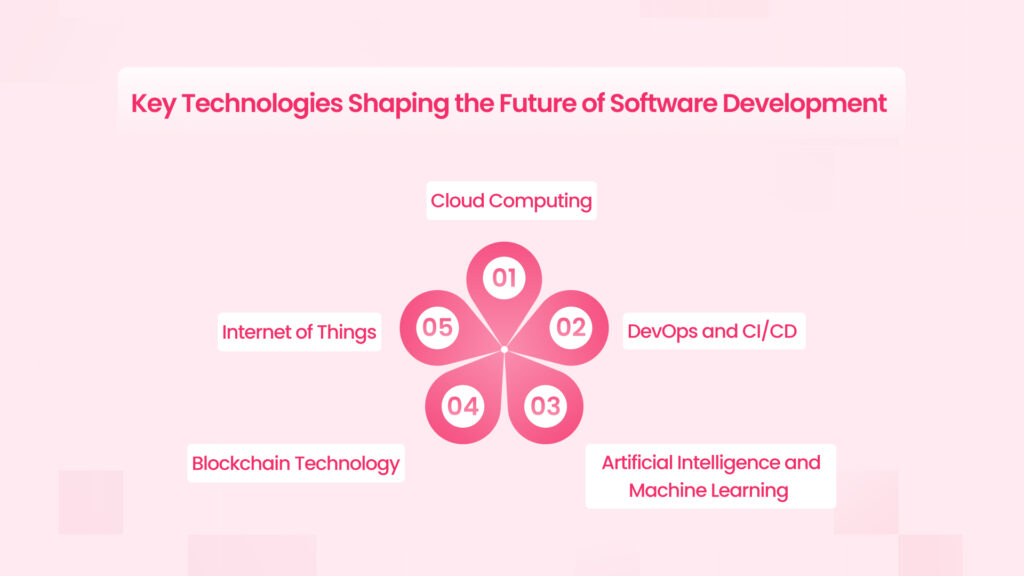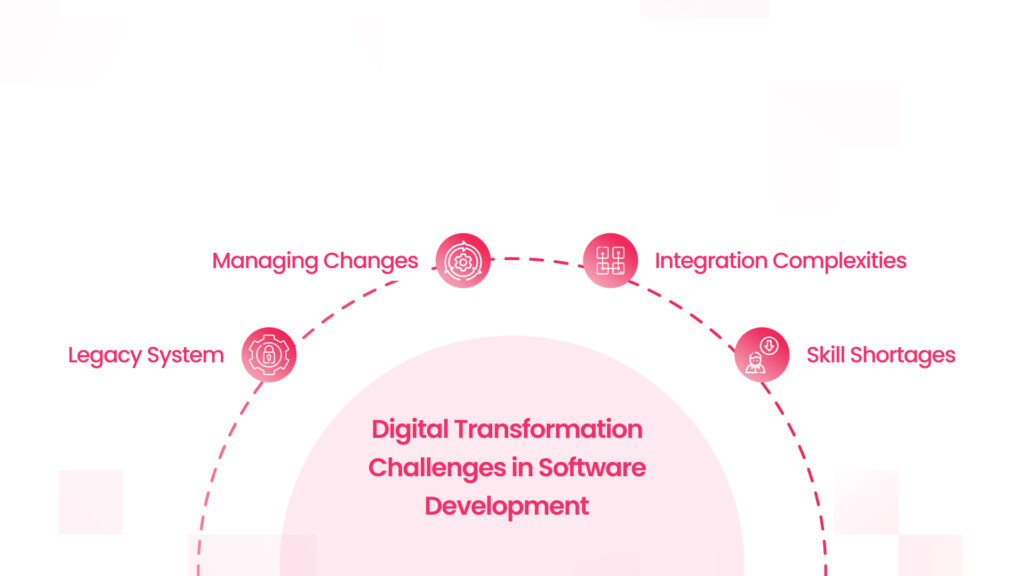How Digital Transformation Impacts Software Development?

Digital transformation has become a defining force in today’s business world, reshaping industries and revolutionizing how companies operate. Digital technologies are no longer a trend in business. It is a radical change in the whole business system from customer interactions to operational processes. Software development is the heart of digital transformation of any business. It ensures they remain competitive, agile, and efficient under dynamic changes to the business environment from conversion to new digital landscape.
This blog showcases how digital transformation impacts software development. It also deals with the challenges experienced, and the opportunities resulting from this change for developers, businesses, and, ultimately, customers.
The Role of Software Development in Digital Transformation
Software development evolved as a major enabler of technological development. But, in the current context of digital transformation, such evolution has proceeded to an order of magnitude increase in scope. When creating custom applications, developers integrate cloud solutions, artificial intelligence, and machine learning to power digital initiatives. Automating a business process, improving the customer experience, or driving data-based decisions are all initiatives underpinned by software development.
In recent years, with evolution of technologies, software development must align to meet the current demand of a present-day business. This requires the adoption of modern frameworks, methodologies, and tools. These can provide a more flexible and speedier time-to-market and seamless integration with other digital solutions.
Exploring Digital Transformation for Your Business
Our Experts Can Help!
Key Technologies Shaping Software Development

Cloud Computing
With the cloud platforms transforming software development, deployment, and scaling, organizations have become less worried about physical infrastructure since they have simplified software deployment. Software developers nowadays develop cloud-native applications that can scale easily, reach everywhere, and be cheaper. Moreover, cloud computing also provides a wealth of tools and services. It includes database storage, analytics, and machine learning, which developers can mold into their applications.
Artificial Intelligence and Machine Learning
AI is driving many diverse industries towards digital transformation, such as healthcare, finance, and retail. They build systems that can learn without human intervention from a data source. They adapt to new information, and potentially make intelligent decisions. AI and ML software applications in software development offer more accurate predictions, automate tasks, and improve user experiences, for example. Developers can make more competent applications by using AI frameworks and libraries to solve more complex tasks. This includes fraud detection or personalized recommendations.
DevOps and Continuous Integration/Continuous Delivery (CI/CD)
Digital transformation has also been involved in DevOps, which refers to the practice of collaboration between development and operations teams. Development cycles become faster with improved quality, along with more efficient operations. Essential to this are Continuous Integration (CI) and Continuous Delivery (CD). It allows developers to deploy updates and improvements in applications quite often. Aside from that, testing and deployment are automated. It ensures that the software becomes fully up to date, with less downtime and better output for the user.
Blockchain Technology
Blockchain, the technology behind cryptocurrencies, has many uses beyond digital currency. In software development, blockchain helps build decentralized applications which run independently, transparently, and securely. Through technology, developers can ensure that data will never be altered, transactions conducted will be protected, and the sharing of information will be decentralized. Industries such as finance, supply chain, and health care are embracing what is generally described as wi-fi in the way it can change their functionality.
Internet of Things (IoT)
With the development of connected devices and sensors, the Internet of Things, IoT essentially revolutionizes software development. Part of the IoT systems involves data collection and analysis from a huge number of connected devices. Here, developers will have to come up with software that can provide real-time processing and analysis of such data, ensuring the network is secure and scalable. From smart homes to industrial automation, the applications of IoT are numerous, and website developers are most important for these systems to flourish.
The Shift Towards Agile Development
There is also a requirement for software development practices that are flexible and adaptive as businesses transform digitally. The long stages and timelines of traditional waterfall development models make them unsuitable for today’s fast-paced, agile environment. Instead, businesses are adopting Agile development methodologies.
Agile methods focus on repeated progress, teamwork, and flexibility. Development teams usually work in short cycles (known as sprints), allowing them to quickly release new features and gather feedback. Thus, companies can act more efficiently against dynamic market requirements, customer demand, and changes in technology.
Agile methodologies also promote cross-functional teams where developers, designers, product managers, and the rest of the team work together throughout the development process. Consequently, this will produce software that is closer to the business goals as well as towards user needs.
The Shift Toward Microservice Architecture
As software systems become more advanced, businesses are departing from the traditional monolithic approach to adopting microservices. A microservices architecture decomposes an application into smaller, distinct components (or services) that communicate with one another using APIs. This approach offers several advantages, particularly for companies undergoing digital transformation.
The applications can be scaled easily by the deployment teams through microservices, as they can deploy new features without scratching the complete application Since each service is independent, developers can use different technologies and programming languages for each, choosing the right tool for every task. This flexibility speeds up the development cycles crucial for any competitive business.
Microservices are used in the digital transformation in order to allow businesses to respond more rapidly to market needs, introduce new functions, and integrate with other digital solutions.
The Importance of Data Security and Privacy
These days, data security and privacy are becoming very important considerations in business because of the ever-heightened reliance on digital technology. So, it follows that the software development must also ensure that applications are developed in such a way that they are secure and, at the same time, protect file and user data from exposure while ensuring that they remain compliant with regulations such as the General Data Protection Regulation or GDPR.
Digital transformation has come up with new challenges in cybersecurity, especially in terms of cloud computing, the Internet of Things, and artificial intelligence. Developers should be ahead of time by constantly updating their skills and putting into practice the application of converging security designs to develop secure applications that protect sensitive data and attacks. This would entail encryption and secure authentication and provide strong access control for the entire software development process.
Role of Software Developers
Software developers are changing roles, and this change has been driven by digital technologies, their developments, and the approaches that go along with them. This means a never-ending upgradation of skills for developers, keeping them always on their toes and acquiring new knowledge every time a new technology comes out or a methodology gets invented. The old-time programming skills are just not good enough these days. Developers now need to possess skills in cloud computing, AI, machine learning, and DevOps practices.
Moreover, software developers must work more together with business stakeholders. This means that in the context of digital transformation, software is more than a technical product; it is also a strategic business asset. Developers now not only have to code but they should also understand the business goals, customers, and market trends in order to develop software that creates business value.
Developers can shift towards full-stack as they work on both ends or front-end and back-end functionalities. This aspect focuses on the versatility of the programmer to develop even entire apps instead of just constructing a single tie into the system with her application. Modern software systems are increasingly complex and increasingly
Need a Reliable Web Development partner to help grow your Business?
Our Experts Can Help!
Overcoming Challenges in Software Development During Digital Transformation

Legacy System
Many businesses still rely on legacy systems that are outdated and difficult to integrate with modern technologies. Migration from legacy systems to newer and more flexible systems may pose a problem regarding their complexity and long duration of performance. Migration strategies must be well-tested by software developers and ensure smooth transitions without disturbing business operations.
Skill Shortages
The fast speed of development in technology has called for a rapid increase in demand for developers with new technology skills in areas such as artificial intelligence, cloud computing, and blockchain. Unfortunately, few of these developers are available as skilled human resources. Organizations requiring such specialists will have to invest in training or upskill their own teams or partner with an outside development agency to meet this requirement.
Integration Complexities
The process of business adopting new digital technologies requires integration with existing systems and software applications. This isn’t an easy task with many systems, platforms, and data formats involved. The developers need to make sure communication is integrated between the old and the new, security is maintained, and integrity is maintained by the developers.
Managing Change
Digital transformation is often associated with major changes within organizations. Teams are to be much more agile and adaptable at accepting the incoming changes in priority and demands. They should walk the business through the requirements of change management to keep all stakeholders informed and development processes on track.
Conclusion
There are many changes that are happening in the world of software development due to the impact of digital transformation. “Keeping up with transformative changes in business requires delivering software solutions that enable these digital initiatives. From cloud to artificial intelligence to Agile methodologies and microservices architecture, transformation has fundamentally impacted all aspects of software development.
There are many opportunities besides the challenges of legacy systems, skill shortages, or complexities associated with integration for developers to be innovative. As software development is impacted by digital transformation, it will require developers to advance their skills constantly, stay ahead of technology and work with businesses to provide software that meets the requirements of modern organizations.
By embracing these changes, businesses can unlock the full potential of digital transformation and position themselves for success in the digital age.
 Shopify
Shopify













